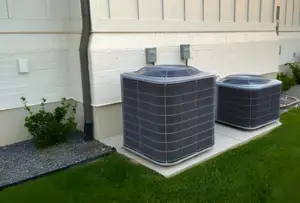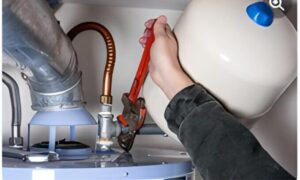Gas furnaces are a common and essential component of many homes, providing warmth and comfort during the colder months. However, an often overlooked and potentially dangerous issue that homeowners need to be aware of is delayed furnace ignition.
This seemingly innocuous problem can have explosive consequences if left untreated. In this discussion, we will explore the hidden dangers of delayed ignition and the factors that contribute to its occurrence.
By understanding the potential risks and taking preventive measures, homeowners can ensure the safety of their families and the longevity of their heating systems. Stay tuned to discover the critical information you need to know to protect your home from this lurking threat.
Causes of Delayed Ignition
Delayed ignition on a gas furnace can be caused by various factors. These include moisture buildup, dust and lint accumulation, sulfur buildup, and combustion gas buildup in the chamber.
Moisture inside the furnace can corrode the firebox and block gas-feeding ports, resulting in improper ignition. Additionally, dust and lint can obstruct the burners, leading to delayed ignition. Sulfur buildup from burning natural gas can also cause delays in ignition.
Furthermore, electronic ignition systems may experience delayed ignition due to combustion gas buildup in the chamber. In some cases, igniter replacement may be necessary to ensure proper furnace functioning.
It is important to address delayed ignition promptly, as it can lead to potential dangers such as furnace damage, loose stack pipes, soot spreading, gas build-ups, and fire hazards.
Regular maintenance and proper furnace care, including inspection and cleaning, can help prevent delayed ignition.
Dangers of Delayed Ignition
Delayed ignition can pose significant risks, including potential furnace damage, loose stack pipes, soot spreading, gas build-ups, and fire hazards.
Furnace damage: Delayed ignition explosions can cause damage to the furnace, including cracking the heat exchanger.
Loose stack pipes: Excess flames resulting from delayed ignition can lead to loose stack pipes, compromising the integrity of the system.
Soot spreading: Delayed ignition can cause soot to spread throughout the home, leading to dirty surfaces and potential respiratory issues.
Gas build-ups: Delayed ignition can result in gas build-ups in the combustion chamber, creating a safety hazard and increasing the risk of fires.
To minimize these risks, regular maintenance and proper furnace care are essential. Experienced HVAC technicians should inspect and clean the furnace regularly, ensuring that gas-feeding ports, burners, and ignition systems are free from obstructions.
Taking these precautions can help prevent delayed ignition and maintain a safe and efficient furnace system.
Prevention of Delayed Ignition
To prevent delayed ignition on a gas furnace, regular inspection and cleaning by experienced HVAC technicians is essential. Cleaning the surfaces, including the exterior and burners, helps remove dirt and grime that can obstruct proper ignition. Careful cleaning of the blower ensures optimal performance without disturbing fan blade counterweights and wiring.
It is also important to clean the pilot or igniter to prevent problems caused by a dirty component. Additionally, light cleaning of the flame sensors is necessary for optimal furnace performance.
Regular Inspection and Cleaning
Regular inspection and cleaning of a gas furnace is crucial for maintaining optimal performance and preventing potential issues such as delayed ignition. To ensure the efficiency and safety of the furnace, the following steps should be taken:
- Clean surfaces, including the exterior and burners, to remove dirt and grime.
- Carefully clean the blower to ensure optimal performance without disturbing fan blade counterweights and wiring.
- Clean the pilot or igniter to prevent problems caused by a dirty component.
- Light cleaning of the flame sensors is necessary for optimal furnace performance.
Contacting Reliable Heating Contractors
When it comes to addressing heating issues and ensuring the safety and efficiency of your gas furnace, contacting reliable heating contractors is essential. Reliable heating contractors, such as Action Air Conditioning, Heating & Solar in the Riverside area, have skilled NATE-certified technicians who are qualified to handle various heating problems, including delayed ignition.
These contractors offer services across the Riverside area, providing assistance with furnace thermostat issues and more. They can conduct regular inspections and cleanings to prevent delayed ignition, ensuring optimal furnace performance. With their expertise, they can identify and address potential causes of delayed ignition, such as moisture buildup, dust and lint accumulation, sulfur buildup, and combustion gas buildup.
HVAC Problems Solved
With their expertise and commitment to customer satisfaction, Action Air Conditioning, Heating & Solar offers comprehensive solutions to a wide range of HVAC problems.
- Schedule an appointment for affordable and professional HVAC services.
- Action Air Conditioning, Heating & Solar offers complete HVAC system installation with professional and clean workmanship.
- Positive customer reviews highlight the satisfaction with the service provided.
- The company is ready to help with any HVAC issues, ensuring indoor comfort and safety.
From HVAC system installation to troubleshooting and repairs, Action Air Conditioning, Heating & Solar has the knowledge and experience to solve any HVAC problem. Their skilled technicians are trained to handle various heating and cooling issues, including delayed furnace ignition.
With their commitment to customer satisfaction, they provide affordable and professional services, ensuring optimal indoor comfort and safety. Customers have praised their workmanship and the high level of service they provide.
Whether it's routine maintenance or emergency repairs, Action Air Conditioning, Heating & Solar is ready to assist with all HVAC needs in the Riverside area. Contact them today for reliable and efficient solutions.
Frequently Asked Questions
How Common Are Delayed Ignition Explosions in Gas Furnaces?
Delayed ignition explosions in gas furnaces are a potential safety hazard. While the frequency of such incidents may vary, regular maintenance, cleaning, and inspection by experienced HVAC technicians can help prevent these dangerous situations.
What Are the Signs of Delayed Ignition in a Gas Furnace?
Signs of delayed ignition in a gas furnace include a clicking or snapping sound during ignition, a strong smell of gas, visible soot or black smoke around the furnace, and inconsistent or weak flames.
Can Delayed Ignition Be Fixed Without Professional Help?
Delayed ignition in a gas furnace should be addressed by a professional HVAC technician. Attempting to fix it without professional help can be dangerous and may lead to further damage or safety hazards.
Are There Any Warning Signs or Indicators That Can Help Identify a Potential Delayed Ignition Issue Before It Becomes a Danger?
Warning signs of a potential delayed ignition issue include unusual smells, loud bangs, and excessive soot or black smoke coming from the furnace. If any of these indicators are present, it is important to seek professional assistance to prevent potential dangers.
How Often Should a Gas Furnace Be Inspected and Cleaned to Prevent Delayed Ignition?
A gas furnace should be inspected and cleaned annually by experienced HVAC technicians to prevent delayed ignition. Regular maintenance minimizes the risks associated with delayed ignition and ensures optimal furnace performance, reducing the potential for explosive threats.
Conclusion
In conclusion, understanding the causes and dangers of delayed ignition in gas furnaces is crucial for ensuring the comfort and safety of homes.
Factors such as moisture buildup, dust accumulation, sulfur buildup, and issues with electronic ignition systems can contribute to delayed ignition.
These delays can lead to potential explosions, damage to the furnace, loose stack pipes, and the risk of fires.
Regular maintenance, inspection, and cleaning by experienced HVAC technicians are essential for preventing delayed ignition and ensuring indoor comfort and safety.







